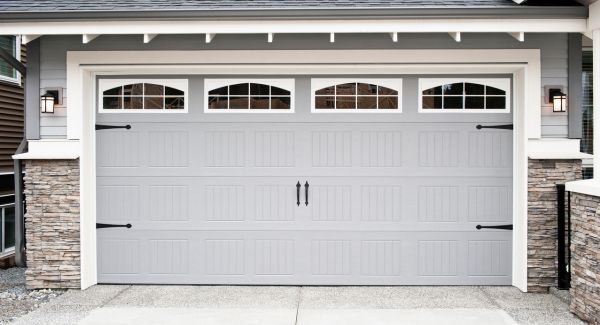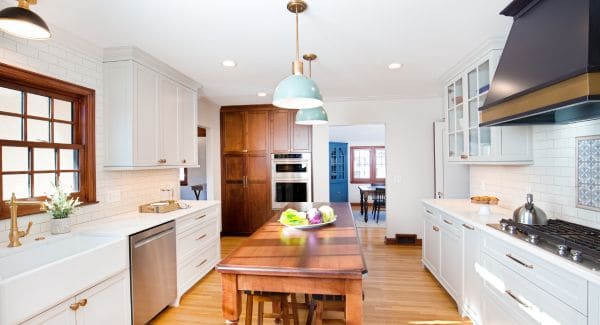Last Updated on June 8, 2023

Did you know that this April marks the 50th anniversary of Earth Day? The national day for mobilization is focused this year on climate action. According to the site, “The time is now for citizens to call for greater global ambition to tackle our climate crisis.”
If you’re a global citizen who believes in doing their part, you know that we’ll need to take action on more than one day a year in order to make a lasting difference. As kids, we were taught the tried and true adage of reduce, reuse, recycle. Now as adults, there are even bigger steps we can take.
In honor of this milestone Earth Day, we challenge you to make a change around your home that will have a positive impact on the environment. Switch to energy efficient light bulbs. Replace your garage door to cut on heating and cooling. Check your appliances and change your filters. And if you want to make a big difference that will benefit both the environment and your wallet in the long run, consider officially going green.
Here are three of the best green home certification programs out there:
What is a green home?
In its most basic definition, a green home is a type of house that’s designed to be environmentally sustainable. Such measures can be made in a variety of ways. Green homes may be built or remodeled with materials that are more efficient in managing temperature in order to conserve energy. They may include sustainable energy sources, such as solar or geothermal, and/or be sited to take maximum advantage of natural features to improve energy efficiency, like sunlight and tree cover. Green homes can also be built with sustainable, recycled, or used materials, producing less waste. Green homes may also feature energy-efficient appliances or be designed to conserve water or to improve air quality.
Unfortunately, there is no one government standard for what constitutes a green home build or remodel. However, in the United States, there are several nonprofit and government agencies that will certify a home as a green home.
Green home certifications by the U.S. Green Building Council
The U.S. Green Building Council’s Leadership in Energy and Environmental Design (LEED) program is the most widely used green building rating system in the world. The LEED program covers all types of residential design and construction projects. There are four levels of LEED certification: Certified, Silver, Gold, and Platinum. A project earns points based upon its degree of achievement, and those points translate into the various LEED levels.
According to their site, LEED certified green homes use less energy and fewer resources than standard homes, and they are healthier for you and your family. That can save you money on water and other utilities during your tenure in the home. There is some evidence that LEED certification can also increase the value of your home when you’re ready to sell.
Learn more about LEED certification: usgbc.org/tools/leed-certification/homes
Green home certifications by the U.S. National Association of Home Builders
The National Green Building Standard was developed by government, environmental, and industry experts with a broad range of expertise. The NGBS is the only residential green building rating system approved by the American National Standards Institute (ANSI) as an American National Standard. Both new and remodeled single-family homes can be awarded a Bronze, Silver, Gold, or Emerald certification level, depending on the number of green practices successfully incorporated in its design and construction.
The HGBS is verified by independent, third-party experts. The program focuses on three primary attributes that the NAHB considers highly marketable to today’s home buyers: healthy homes, lower operating costs, and sustainable lifestyles.
Learn more about NGBS certification: homeinnovation.com/services/certification
Green home certifications by the U.S. Department of Energy
The Department of Energy sponsors a green certification program focused specifically on energy efficiency, called Zero Energy Ready Homes. The Zero Energy Ready Homes program builds upon ENERGY STAR® requirements, combining them with proven Building America innovations and best practices. Qualified third parties verify the homes to be 40–50% more energy efficient than a typical new home. While there are no specific levels of ZERH certification, success generally corresponds to a Home Energy Rating System (HERS) Index Score in the low- to mid-50s, depending on the size of the home and region in which it is built.
Learn more about Zero Energy Ready Homes: energy.gov/eere/buildings/zero-energy-ready-homes
Which green home certification program is right for you?
In addition to the certification programs listed above, you may be interested in the following additional green home programs:
- EPA ENERGY STAR®
- EPA Indoor airPLUS
- EPA WaterSense
- FORTIFIED Home
- Passive House Institute US
- RESNET’s Home Energy Rating System (HERS)
As you can see, there is no one green program or scale by which to certify your home. In large part, you should choose green certification based on which one best meets your economic and lifestyle goals. However, you can ask your builder or contractor which programs they participate in. And don’t forget to ask your REALTOR® what programs will add the most value to your home.
Find a certified green home near you!
Taking steps to certify your house as a green home has many benefits. In addition to doing your part to protect the environment for future generations, it could save you big bucks in the long run. However, even if you’re not ready to commit to completing a green certification program, you could still benefit from its effects. Commit to making your next home a green home.
Does owning a green home sound like the perfect plan for you? Find eco-friendly homes across Western North Carolina now!



